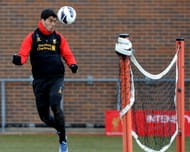The entire incident stemmed from the fact that Suarez had called the Manchester United defender a ‘negro’, which is actually a colloquial term of endearment in Uruguay. Cameron may speak of multiculturalism but there was no attempt made by the media when it came to actually understanding Suarez, and by extension, Uruguayan culture. How then, can there be talk of multiculturalism?
Luis Suárez admitted he and his wife, Sofia, “cried a lot” during that week of travelling back and forth to Manchester to protest his innocence in the Patrice Evra affair. There was utter despair when the guilty verdict arrived accompanied by an eight-match suspension. We can only guess at the extent of the misery in the Suárez household following the 10-match ban for biting Branislav Ivanovic but, crucially, so can Liverpool.
- Andy Hunter, The Guardian
The papers did at least report that Suarez did weep over what he had done before the FA delivered its verdict, but that was more a statement in passing than anything concrete. Papers focused more over his future at Liverpool, and rather disgustingly, a requirement for him to have anger management counselling. That racism row was a one-off incident, but where was this Linotype during the John Terry-Anton Ferdinand affair? Where was the suggestion of Terry taking counselling at that time?
There wasn’t any.
While there is no excuse to what he did to Branislav Ivanovic, Suarez would have surely wanted to say something in terms of an apology. All that was mentioned at the time was that the Serb did indeed accept it. Once again, there was no motion by the papers to record what Suarez had said, or wanted to say.
The 10-match ban that Suarez received was because the FA wanted to send a “strong message that such deplorable behaviours do not have a place in football”, while noting that “all players in the higher level of the game are seen as role models, have the duty to act professionally and responsibly, and set the highest example of good conduct to the rest of the game – especially to young players.”
If footballers are indeed seen as role models, then is it not the role of the press, who pride themselves as the silent guardians of all that goes on, to further that image? Is it also not their responsibility to make sure that footballers are portrayed in the right light, with more attention given to what they do right, if the next generation of people are to be brought up the right way? Papers were quick to decry what Suarez did, but there was little praise of what he did to rectify those errors.
But then, as Dan Brown has now popularised, quis custodiet ipsos custodes? Who will guard the guards?
Given all that has happened, it makes sense to see Suarez want a move away from the UK. The minds of young children are extremely impressionable and it is to these children that the media owes the responsibility of inculcating the right ideas. And that can only happen if their parents, who are responsible for bringing them up, are also allowed access to news that contains the right values.
The EPL is the world’s most competitive football league, but the press should realise that that competitiveness is coming at a cost. While they may not have been responsible for some of the less appetising qualities that Suarez brought to England, that they have exacerbated these qualities and have drawn attention away from the fact that he is an excellent striker with world-class attributes that the league is lucky to have is undeniable.
But given the attitude shown to him by the press, the league may not be so lucky in the future. And that needs to change for the good of the game.

